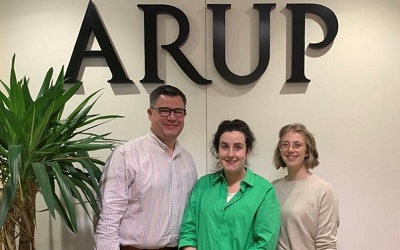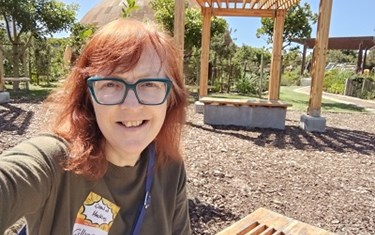 In this blog Emilly Kitching Bower, Marc Watterson Kim Power showcase three different perspectives on the value of volunteering including its impact on the individual, the employer and the profession.
In this blog Emilly Kitching Bower, Marc Watterson Kim Power showcase three different perspectives on the value of volunteering including its impact on the individual, the employer and the profession.
The Value of Volunteering
Volunteering plays a pivotal role in shaping and nurturing various professions, and the field of town planning is no exception. The RTPI offers numerous opportunities for professionals to contribute their time and expertise.
Emilly, Kim and Marc have all held numerous voluntary roles for the RTPI, including the role of Chair of the North West. They also all work for Arup, and were able to support and advise each other during their years as Chair, sharing insights and guidance on the experience of volunteering.
In this blog they delve into why volunteering for the RTPI significantly aids those giving their time for free, to the companies supporting their staff, and in the growth and development of the town planning profession.
The Value to the Individual – Emilly Kitching Bower
Emilly Kitching Bower is a Senior Town Planner at Arup and the current RTPI North West Chair for 2023.
Volunteering for the RTPI has given me the opportunity to step up, above and beyond what I do in my day job as a Senior Town Planner at Arup.
Through volunteering, I’ve strengthened my skills at chairing meetings and become used to managing a room of up to thirty volunteers at a time. Similarly, I’ve improved my presentation, communication and team working skills through working with task groups, active volunteers and planning professionals to support the delivery of CPD events, social and educational activities. I’ve also increased my professional network from working with planning professionals across the North West, but also nationally with the central RTPI team and the other phenomenal chairs this year.
In being able to develop these skills outside of work, this has improved what I can deliver for Arup and the enhances the projects I work on. I have been able to gain the maximum benefit from volunteering for the RTPI because my colleagues, manager and directors have strongly supported and encouraged me to get involved since I started volunteering for the RTPI four years ago. Volunteering for the RTPI is a great opportunity to learn something new, meet new people and develop these key skills which have enabled me to become a better town planner.
The Value to the Employer- Marc Watterson
Marc Watterson is an Associate Director at Arup, and was the Chair of the RTPI NW in 2014, the centenary year.
From an employer’s point of view, volunteering gives an opportunity to widen out their network in another avenue that might otherwise not be considered. It gives exposure to a wide range of people and organisations within the region – sometimes potential clients, often collaborators and occasionally friendly competition. It also gives valuable insight into the work of the RTPI and their policy influencing role through being involved by hosting and leading round tables and discussions around emerging issues, forthcoming changes, new areas of research and potential influence. It also gives more of an opportunity to get involved in speaking at events in the region, being part of the annual awards, the annual dinner and a range of other activities.
I was fortunate enough that both my employers at the time I was chair (Taylor Young / IBI Group (Arcadis) and then Pegasus) completely shared my vision of the benefits that being involved gave me individually for my personal and career progression but also for the firms in terms of exposure and presence and supported me with their time. I would certainly advocate the potential benefits of supporting colleagues to volunteer and its now a pleasure to be able to do the same – initially for Kim and now for Emilly.
The Value to the Profession – Kim Power
Kim Power is a Principal Urban Planner at Arup. She was Chair of the RTPI NW for 2020 during the Covid-19 lockdowns.
There are three key areas where all RTPI volunteers can help advance the profession – by influencing positive change, knowledge and skill development and building lasting relationships.
Through volunteering, town planning professionals actively contribute to the development and dissemination of best practices within the industry. By taking part in committees, discussions, research, and policy formulation, volunteers influence the direction of the profession and help set up standards that enhance the quality of our work. The dedication of volunteers to improving planning practices and advocating for areas such as sustainable development, or town planning apprenticeships, helps the profession.
Engaging in committees, working groups, and initiatives exposes volunteers to diverse perspectives, innovative ideas, and contemporary challenges. By taking part in these activities, volunteers gain insights that go beyond their daily routines, fostering a deeper understanding of the intricate dynamics that shape urban environments, and bringing this learning back to their day jobs.
Volunteering within the RTPI enables professionals to forge meaningful connections within the town planning community. Interacting with fellow volunteers, mentors, and industry leaders fosters relationships that can lead to collaborative partnerships, job opportunities, and a sense of camaraderie. These connections expand your professional networks and contribute to a robust, supportive and interconnected town planning community.
Overall Reflections
Volunteering for the RTPI is a compelling and rewarding endeavour that that enriches both the individual planner, planning organisations and the town planning profession as a whole. Through collaboration, skill enhancement, networking, and the power to influence positive change, volunteers actively contribute to shaping more vibrant, resilient, and fair urban environments. As professionals engage with real-world challenges and immerse themselves in meaningful projects, they not only advance their careers but also play an instrumental role in shaping the future of planning.



